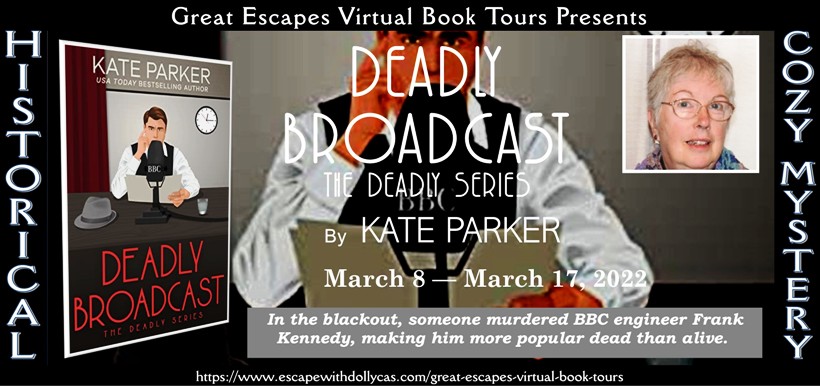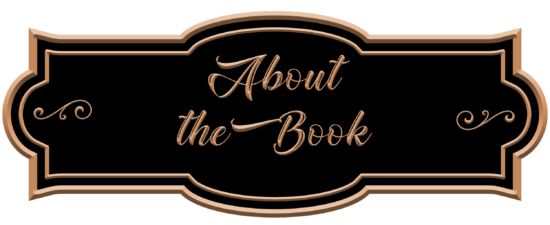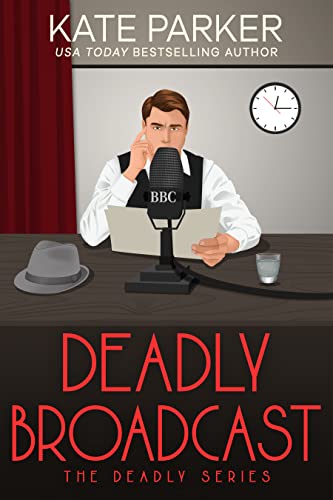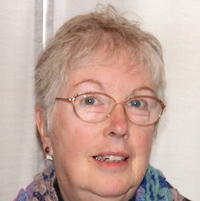
Broadcasting House, the headquarters of an already huge BBC organization in 1930s Britain, figures as almost another character in Deadly Broadcast. It’s the location where in reality Edward R. Murrow recorded his CBS broadcasts that were transmitted by the BBC towers across the Atlantic to America. It was the work location for the three murder victims and their suspected killers in Deadly Broadcast. And it is a fascinating building in London near the shopping mecca of Oxford Street.
While the BBC began transmitting in the early 1920s, it wasn’t until 1928 that the headquarters at Broadcasting House began to be constructed. The windowless central tower of the building built of structural brick contains the studios, since this material would absorb sounds. The exterior, with plenty of windows, is built of steel clad with Portland stone.
Completed in 1932, the first broadcast from the building was by Henry Hall and the BBC Dance Orchestra on 15 March. It wasn’t until 15 May that the building was officially opened. Until the building was renovated and enlarged in the 21st century, it sat on a traffic island surrounded by streets. At eight stories above ground and three or four below ground, the building towered over the other buildings in the adjacent area. Above the front door is a famous statue of an old man and a young boy.
Inside the window filled lobby, there is another famous carving, “The Sower,” next to the elevators and at the time when Deadly Broadcast takes place, the reception desk was to the left of the elevators as people entered the lobby through the main double doors. Beyond the elevators was the artists’ lobby where rehearsal and performance times were listed for each studio.
From what I could find, and the information about Broadcasting House from this time is contradictory, Edward R. Murrow did broadcast from the BBC Empire Network studio, 4C. The other studios on the fourth floor, 4A and 4B, were used for news programs broadcasted in the United Kingdom.
The restaurant that Olivia uses to meet with the musicians was a full floor underground. It was decorated in a modern, art deco style and was quite popular with the actors, musicians, and staff who worked in the Broadcasting House building.
The largest of the drama studios was on the sixth floor, 6A. Around it were smaller, rehearsal rooms and rooms to include special effects during the performances. Radio plays were as popular as movies and live theater at this time. 6A is where several of the scenes with the actors take place.
The largest of the concert halls, on the ground floor, was used for sleeping during World War II for employees who had to work late with the blackout, and later the bombing, going on in London so they could spend the night in safety. There were some smaller rehearsal and performance halls used by small orchestras, the largest of which was on the eighth floor at the top of the building. Music on the radio then was as popular as it is now, but it was dance bands and marching bands and symphonies, not rock and country. Olivia waits outside this room in some of the scenes to talk to musicians.
Also on the top floor was the control room, where the engineers worked. Apparently, the first level of engineering for a broadcast was done in the listening rooms right outside the studios. Then the sound was transmitted up to the control room by telephone wires and then to the broadcast towers in the countryside. This was all done by analog and telephone wires and radio vacuum tubes. Digital and wireless came much later. Transmission to the United States was sent over shortwave. Within the United Kingdom, signals were sent over medium wave, which we know as AM radio.
Please don’t ask me to explain the engineering information, because I don’t understand it. The descriptions of where people are and what they are doing in Deadly Broadcast are accurate, but nowhere in the book will you find technical information.
Later on in the war, Broadcasting House will be bombed at least twice, doing major damage. To avoid losing broadcasting capabilities altogether, many of the acting groups and orchestras were sent to transmit from facilities built in smaller cities while news studios were built on the lowest level of the basement of Broadcasting House. All of these programs were organized and transmitted on one channel. All the other channels were kept quiet for the entire war or used by the military.
I hope you enjoyed this brief tour of Broadcasting House. This could possibly add to your reading pleasure of Deadly Broadcast or your understanding of a fascinating era.
Deadly Broadcast is the eighth book in The Deadly Series by Kate Parker. Available in ebook and print from Amazon, Barnes and Noble, Kobo, and Apple.

The Deadly Series: Book 8
Publication Date: March 8, 2022
 The phony war has dragged out past Christmas into a dark and dreary New Year, 1940.
The phony war has dragged out past Christmas into a dark and dreary New Year, 1940.
In the blackout, someone murdered BBC engineer Frank Kennedy, making him more popular dead than alive. A blackmailer and bully, he sold out his friends, assaulted his Broadcasting House colleagues, and sabotaged his employer.
Kennedy was also a government informant against the IRA. Despite arrests of members, the IRA is still planning more attacks against British civilians. Attacks Frank Kennedy might have been involved in.
Britain’s counterintelligence spymaster orders newspaper reporter Olivia Redmond to find Kennedy’s killer and learn which of the many motives led to his murder. Olivia quickly learns how vicious Frank Kennedy was and halfway hopes his killer escapes hanging.
Until his killer strikes again…




 Since she was unable to build a time machine in her backyard, Kate Parker immerses herself in research and then creates the world that lives inside each book that she writes. Her favorite place is London and her time travel destination is anywhere from the late Victorian era through World War II. Since she lives in the Carolinas with her daughter and a 95-pound puppy, the practical side of her is thankful for air conditioning and all the modern comforts of life. Comforts she will take with her if she ever figures out how to build her time machine.
Since she was unable to build a time machine in her backyard, Kate Parker immerses herself in research and then creates the world that lives inside each book that she writes. Her favorite place is London and her time travel destination is anywhere from the late Victorian era through World War II. Since she lives in the Carolinas with her daughter and a 95-pound puppy, the practical side of her is thankful for air conditioning and all the modern comforts of life. Comforts she will take with her if she ever figures out how to build her time machine.

March 8 – Literary Gold – SPOTLIGHT
March 8 – Novels Alive – GUEST POST
March 9 – Christy’s Cozy Corners – REVIEW, CHARACTER GUEST POST
March 9 – Maureen’s Musings – SPOTLIGHT
March 10 – I Read What You Write – AUTHOR INTERVIEW
March 10 – Baroness’ Book Trove – SPOTLIGHT
March 11 – Celticlady’s Reviews – SPOTLIGHT
March 11 – Brooke Blogs – CHARACTER GUEST POST
March 12 – MJB Reviewers – SPOTLIGHT
March 12 – Escape With Dollycas Into A Good Book – AUTHOR INTERVIEW
March 13 – Books a Plenty Book Reviews – REVIEW, CHARACTER INTERVIEW
March 13 – Sapphyria’s Book Reviews – SPOTLIGHT
March 14 – Reading Is My SuperPower – GUEST POST
March 14 – #BRVL Book Review Virginia Lee Blog – SPOTLIGHT
March 15 – Cozy Up With Kathy – REVIEW
March 15 – Ascroft, eh? – CHARACTER INTERVIEW
March 16 – fundinmental – SPOTLIGHT
March 16 – Elizabeth McKenna – Author – SPOTLIGHT
March 17 – BookishKelly2020 – SPOTLIGHT
March 17 – Connie’s History Classroom – REVIEW



















I really enjoy historical fiction and this books sounds really interesting. Looking forward to reading the book.
Thank you for sharing your bio and book details and for offering a giveaway, this sounds like an excellent read and I am looking forward to it
HAPPY BOOK BIRTHDAY, Kate! I enjoyed the guest post and Deadly Broadcast sounds like a thrilling mystery for me to enjoy! Good luck with your book and the tour! Thanks for sharing it with me and have an awesome day!
I enjoyed reading this excerpt – well done!
Thank you for sharing this.
[…] 8 – Novels Alive – GUEST […]
[…] – Please visit all the stops. March 8 – Literary Gold – SPOTLIGHT March 8 – Novels Alive – GUEST POST March 9 – Christy’s Cozy Corners – REVIEW, CHARACTER GUEST POST March […]